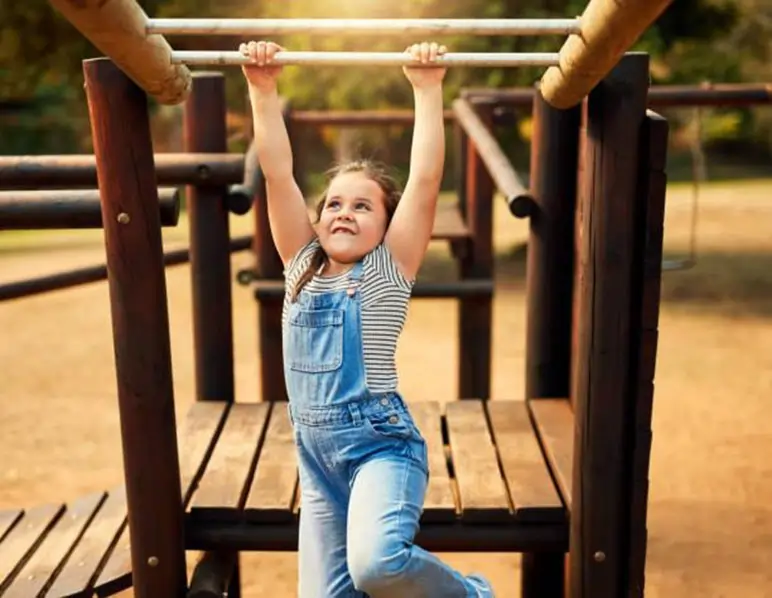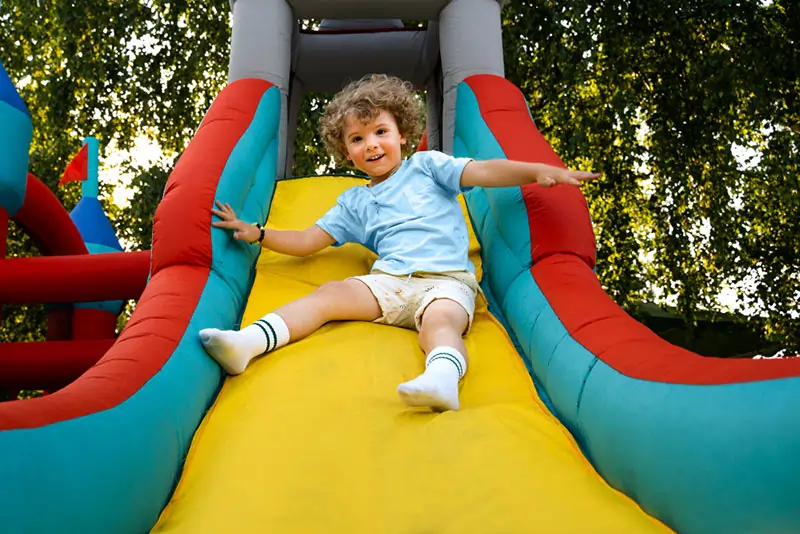From Fun To Fitness: How Monkey Bars Benefit Your Child’s Growth
In the world of children’s play, monkey bars stand as an iconic fixture, inviting youngsters to climb, swing, and hang with joyous abandon. Beyond their reputation as a playground pastime, monkey bars offer many physical and cognitive benefits to a child’s holistic growth.
These seemingly simple structures are essential to nurturing a child’s development, from building strength to enhancing coordination and fostering social interactions.
In this article, we will delve into the multifaceted advantages of monkey bars, exploring how they seamlessly combine fun and fitness to create a foundation for healthy growth.

1. The Physical Foundations of Play
Monkey bars, featuring an array of leveled rods hanging at different elevations, offer an alluring test for youngsters. Involvement with these bars mandates a fusion of power, equilibrium, and synchronization – all of which assume a crucial function in progressing physical growth.
As children clutch, oscillate, and traverse amid the bars, they inadvertently bolster the musculature of their upper body, encompassing the arms, shoulders, and core. This recreational pursuit serves as an inherent exercise, adding to the cultivation of brawny potency and stamina, establishing the groundwork for a lifestyle characterized by liveliness and movement.
Therefore, it is essential that your child interacts with monkey bars while still young. These bars are primarily found in playgrounds, but you can get one for your backyard from various online shops.

2. Building a Foundation of Physical Competence
Monkey bars are a testament to the allure of physical challenges for children. As they clamber onto these structures, a medley of strength, equilibrium, and synchronization comes into play.
The act of clutching, swinging, and transitioning from bar to bar serves as a natural catalyst for strengthening upper body muscles. Young arms and shoulders are ignited with newfound vigor while the core engages to maintain balance, setting the stage for comprehensive muscular growth.
3. Enhancing Cognitive Coordination
While monkey bars celebrate physical prowess, they also serve as a training ground for cognitive coordination. Navigating from bar to bar necessitates a meticulous orchestration of hand-eye coordination and spatial awareness.
As young adventurers grasp, swing, and shift their weight, they refine their proprioceptive senses – the internal compass that allows kids to comprehend their body’s position in space. This heightened awareness extends beyond the playground, enhancing their aptitude for fine motor skills, body control, and spatial judgment.
4. Embracing the Joy of Playful Workouts
In a world where screen time often contends with outdoor play, monkey bars provide an antidote to sedentary habits. Unlike conventional exercise routines that might seem monotonous, monkey bars effortlessly fuse playfulness with physical exertion.
Children are naturally drawn to the thrill of climbing and swinging, blissfully unaware of the workout they’re embarking upon. This organic approach to movement has a twofold benefit: it kindles the flames of enthusiasm for staying active and underscores the fact that exercise can be delightful.
5. Cognitive Growth Through Play
While monkey bars are undoubtedly a physical activity, they also stimulate cognitive growth in children. The decision-making process involved in choosing the next bar to grab or determining the timing of each swing hones their cognitive skills.
Moreover, overcoming obstacles and finding the best route to traverse the bars fosters problem-solving abilities, enhancing their capacity to analyze situations and make informed decisions. The sense of accomplishment derived from conquering the bars further boosts self-confidence and a positive attitude toward challenges.

6. Social Interactions and Team Dynamics
Monkey bars are often a hub of social interactions on the playground. Youngsters gather around this activity, rotating, cheering one another on, and sharing tips and methods. These exchanges nurture the growth of social skills like chatting, teamwork, and empathy.
The encouraging environment during monkey bar play adds to establishing long-lasting bonds and a feeling of camaraderie among peers.
7. Coordination and Motor Skills
Beyond muscle development, monkey bars are a training ground for fine and gross motor skills. Navigating from one bar to another demands precise hand-eye coordination, enhancing a child’s ability to judge distances, angles, and movements accurately.
As they swing and shift their weight, they sharpen their proprioceptive sense, which is crucial for spatial awareness and body control. These physical challenges directly contribute to refining essential motor skills that extend far beyond the playground, benefiting their overall physical prowess.
8. The Importance of Risk and Resilience
Participating in monkey bars introduces a controlled element of adventure into a child’s recreation. While they dare to traverse the bars, they become acquainted with their physical boundaries and uncover the excitement of surpassing them.
Triumphing over these trials, even following minor tumbles or hindrances, imparts a sense of resilience. This capacity to confront and conquer challenges constitutes a precious life aptitude that expands beyond the play area, empowering kids to manage hindrances with assurance in different facets of their existence.

Conclusion
In the colorful world of childhood, monkey bars are far more than a source of amusement. They are powerful tools that nurture physical strength, enhance motor skills, stimulate cognitive growth, and cultivate social interactions. The act of traversing these bars encapsulates a multitude of experiences that contribute to a well-rounded and confident child. As parents, educators, and caregivers, embracing the significance of monkey bars in a child’s development allows us to support their growth while ensuring that the values of fun and fitness remain intertwined, fostering a love for movement that can last a lifetime.

